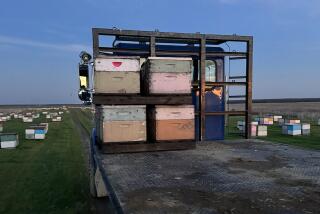African Bee Swarm Can Be Deadly if Angered
- Share via
A so-called African killer bee is no more dangerous than the garden variety honeybee, but if you have agitated a swarm of the killers, watch out, an expert on bee stings warns.
“I don’t like to call them killer bees,” said Dr. Hal Renollett, an emergency room physician and a clinical professor of medicine at the University of California, Davis.
“I prefer to call them African bees,” he said, “and yes, if a swarm of them gets a hold of you, you can forget it. But these bees aren’t out to kill anybody.”
Renollett told emergency room doctors at the 115th annual session of the California Medical Assn. in Los Angeles that people have developed irrational fears about the bees observed recently in central California.
“Frankly, you can’t tell an African bee from a honeybee. They’re a little bit shorter than the average honeybee, but who goes out measuring them anyway? It would take the venom of about 200 of these (African) bees to kill an adult,” Renollett said.
Colony Classifications
The black-and-yellow-striped American honeybee, found throughout the United States, originated in Europe. The bees live in colonies characterized by distinct classifications: workers, drones and queens.
“African bees can be deadly because they tend to mass swarm, so it is possible to be stung by a lot of them. But you have to bear in mind that they are out to defend,” Renollett said.
Studies of the so-called killer bees, known to have stricken fear into the hearts of grown men and women, show they are primarily characterized by their habit of taking off for parts unknown, leaving hives they had been seen cultivating for weeks.
“And believe me, they’ll take off and nobody will know where in the world they went,” he said.
UC entomologists report the “absconding” characteristic as one of the major factors differentiating African bees from honeybees, which cultivate a hive for months, even years, in the same location.
Similar Social Habits
But both kinds of bees have similar social habits bee experts call “colonialism,” and both belong to what is called the superfamily Apoidea, which differentiates bees from their close cousins, the wasps.
“Honeybees are responsible for about 100 deaths a year in the United States, and the people who fall victim die mostly from allergic reaction, not just the venom alone,” Renollett said.
“There have been no deaths attributed to the African bees in the United States that I know of. But when you talk killer bees, even at a university, people come unglued,” he said.
The difference between a honeybee sting and an African bee sting is that honeybees leave the stinger in their victims, Renollett explained.
More to Read
Sign up for Essential California
The most important California stories and recommendations in your inbox every morning.
You may occasionally receive promotional content from the Los Angeles Times.













